Occupational Octaves: Revolutionizing Piano for Special Learners Part 1
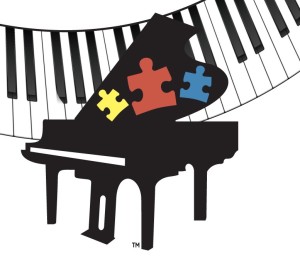 My name is Lee Stockner and I am the inventor of the first true and fully functional special needs, user-friendly musical language, the publisher of an 8-book piano curriculum, and the creator of a training program to properly equip qualified individuals to make incredible gains with special learners at the piano!
My name is Lee Stockner and I am the inventor of the first true and fully functional special needs, user-friendly musical language, the publisher of an 8-book piano curriculum, and the creator of a training program to properly equip qualified individuals to make incredible gains with special learners at the piano!
Gail has been kind enough to invite me to write a regular column for Piano Addict where I’ll tell you about my teaching and my students, plus delve into just what special needs piano lessons are. While I consider myself to be on the forefront of special needs music education, I am certainly not the only one, and I intend to reach out to many other professionals, even ones that I might not entirely agree with, in order to bring in a wide span of opinions.
As Gail and I realized after just a 10 minute phone call, the piano teaching world has various and differing opinions and ideas of what special needs piano lessons are all about, as well as, how to make decisions through individual situations and needs. To help this issue, I plan to grow a glossary of terms and respond to questions any of you may have with the best answers I can give without giving direct advice about students I have not personally met and/or treated. With that being said, this is the first part of my introductory blog and I’d like to use to it tell you a story of overcoming disabilities through music.
Alie is severely autistic. He cannot read or write, and is nonverbal and hyperactive. He requires full-time care, and for more than 20 years his family has engaged a team of professionals who collaborate to help develop his full potential. The simplest tasks and challenges are incomprehensible for him. Using the bathroom or tying shoes with independence has never been an option.
He engages in numerous behaviors that we in the Autism field call “stims” on a frequent and often obsessive basis. Alie couldn’t even qualify to take an IQ test to determine a point of reference for his intelligence markers. Needless to say, Autism causes a tremendous amount of stress in his life. But would you believe me if I told you that this same young man could not only learn to play the piano, but could also become proficient enough to be invited to play the National Anthem at C.J. Ramone’s (of the legendary punk rock band The Ramones) Autism Speaks Benefit?
But before we get to Alie’s big moment on stage, let’s discuss how he got there. In 2008, I was a teacher’s aide at a school for Autism during the day where Alie attended. In the evenings, I gave piano lessons. One day, his mother approached me and asked if I could help him to learn to play piano. Ironically, at the time I was toying with the idea of using a learning system which incorporated colored letters in rhythmically designed boxes which I was confident could be utilized for teaching special needs learners in lieu of traditional methods that include black symbols on white sheet music. I began writing sheet music using my method and soon found that Alie could learn to play the same songs that I taught my non-special needs learners. Here’s what the music looks like:
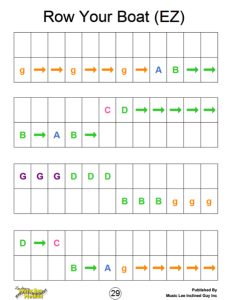
Today, Alie and I will have our 315th lesson, during which he will play C, D, E, F and G Major 3 octaves scales, Fur Elise, Pathetique Sonata, Clementi’s Sonatina (Op. 36 No.1) the Hungarian Rhapsody and more! He will do so using perfect piano fundamentals, meaning each note, finger and beat will be played accurately. He absolutely and undoubtedly can NOT read a single note of traditional music. However, when your student begins playing Fur Elise with an E & D# using the 4th & 3rd fingers, so does Alie. When your students learn the crossovers and crossunders of traditional scales and develop muscle memory for each one, so does Alie. When you perform for an audience and have an irreplaceable emotional rush from the applause, so does Alie! And speaking of the emotional rush from the applause… Here’s the video from the Autism Speaks benefit so you can see for yourself.. It was a triumphant moment!
And here’s the first page of The National Anthem, featured in Book 6 of Occupational Octaves Piano™, so you can see just what Alie is reading:
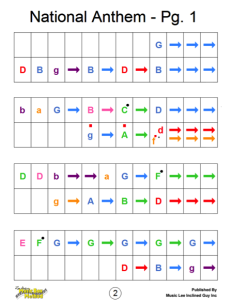
As I was saying earlier, there are a great number of definitions necessary to truly understand exactly what this world of Special Needs Music Education is all about, so instead of getting overly clinical and using the jargon from the worlds of Special Education, Music Therapy and Occupational Therapy, I will use definitions personally created for this forum and attempt to provide a starting point of thought for those who are inexperienced, curious or confused about Special Needs Piano Lessons. The first definition I will concentrate on is what I call a student’s ability to “Functionally and Easily Translate Music.”
As pianists who play music at a decent level (let’s say a player who can accurately play a song like Fur Elise) we are able to “functionally and easily translate music.” I define this as when a player who reads the notes is putting in as much effort to translating the note as he/she puts into playing the note or returning the eyes to the page to read the next note. You and I can look at any note on any page and understand almost immediately exactly which note(s) to play, which finger(s) to use and how long to hold for. Imagine if each and every time you had to read a note you’d have to stop, think and process the information? You wouldn’t be a very good piano player! Your ability to translate the note and immediately start sending signals to your fingers and eyes is honed in and uninterrupted while working on your craft.
In the special needs world, we have two types of piano students. First there are those who do not possess the ability to comprehend the original language of music. These students are usually considered “low functioning” and are often incapable of many tasks. People in the past may have referred to a person like this as “mentally retarded,” but the more accepted term is “developmentally disabled.” This is the category that Alie falls under.
The other category includes students who can read notes individually, but cannot turn that skill into actually playing the piano. This challenge will most likely manifest with the student with ADHD. These types of learners will tremendously lack focus, look to play music fast, reject guidance & constructive criticism, and mostly won’t be continual students into significant music such as Fur Elise.
I have solutions for students in both of these categories, and in future columns I will share more on how to help all types of special needs learners, but for now I’d like to let you all digest this idea of “functionally and easily translating music” and to consider whether your students are currently doing so.
Stay tuned for Part 2 of this introductory blog soon!
I invite you to send me a friend request on Facebook, plus I can be contacted as follows:
occupationaloctavespiano.com Facebook Personal OOP Facebook Page Twitter YouTube Instagram
Email: Lee@OccupationalOctavesPiano.com
Lee Stockner is a self-made inventor, music educator, special educator, business owner, program creator, instructor trainer, author, publisher and innovator. Growing up on Long Island in the 1980’s, Lee showed an early and obvious talent for the piano. Lessons began for him at age five with an incredible teacher who trained him to teach by age 15. Before turning 20, Lee had already become a pianist in demand in his community and a fully booked piano teacher.
Being a learner diagnosed with Attention Deficit Disorder himself proved problematic and he never followed through with his formal education, but took it upon himself to learn in life. When first approached to work with a student with Autism, a natural talent emerged and he shortly thereafter began working at a school for students with severe Autism. He was able to learn on the job what many learn in a classroom with a professor and this hands on experience was highly empowering! He was soon learning to think outside the box, as creative minds do in challenging situations.
When approached to teach students with disabilities so severe they’d never be able to learn traditional music notation, he created Lee Stockner’s Music Box Method™ to give these students an alternative language of music that is Special-Needs-User-Friendly. After reaching the 10,000 mark with piano education, special education and special needs piano lessons, he was ready to create a curriculum based on this new language.
He created his company, Music Lee Inclined Guy, Inc., became a registered music publisher, and published Occupational Octaves Piano™ in September of 2014 as a full mainstream music curriculum written in Lee Stockner’s Music Box Method™. Mr. Stockner has grown the the worldwide group of Occupational Octaves Piano™ certified instructors in addition to the hundreds of teachers, therapists and parents who have used books 1-3!
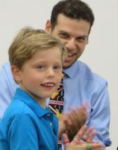
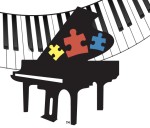

Thank you all for the kind words!!
I know that Lee will be happy to read this! Thank you so much for reading and Happy New Year!
This is such an awesome system! I’m an slp, mom and friend to a few moms who will be so thrilled to try this curriculum. Just pretty great!
This is incredible! Amazing work!